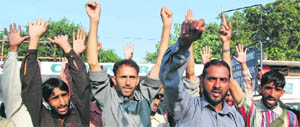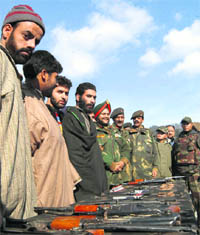|
Surrendered hopes
Many Kashmiri
militants, who have eschewed the path of violence and
surrendered in the hope of living a normal life, are a
disillusioned lot as the incentives of the government’s
rehabilitation policy have not reached most of them, reports Ashutosh
Sharma from Jammu
 A
recent announcement
by the Centre to grant amnesty to "misguided Kashmiri
youth" undergoing arms training in terror camps in Pakistan
occupied Kashmir (PoK), who want to surrender and return home,
has brought cheer to hundreds of families in the troubled state.
These youths had left for PoK many years ago for arms training
and are keen to return. A
recent announcement
by the Centre to grant amnesty to "misguided Kashmiri
youth" undergoing arms training in terror camps in Pakistan
occupied Kashmir (PoK), who want to surrender and return home,
has brought cheer to hundreds of families in the troubled state.
These youths had left for PoK many years ago for arms training
and are keen to return.
While the state
government has framed new guidelines for the rehabilitation of
militants who are willing to surrender, those who did so under
an earlier policy, framed in 2004, in the hope of living a
normal life are a disillusioned lot. The incentives of the
rehabilitation policy never reached most of these surrendered
militants. This has brought disillusionment, fear and penury to
them, and in certain cases, even compelled them to reclaim
militancy.

In October last year, surrendered militants staged a demonstration in Jammu, protesting against rejection in the recruitment drive by the security forces and several unfulfilled promises by the state government.
Photos by Amin War and Inderjeet Singh |
Though the
recent decision has renewed hope, but in the absence of proper
rehabilitation many former militants, who continue to be
labelled as "infidels", feel "cheated".
Earlier they were considered outlaws but after surrendering they
continue to be discriminated against as they have not got the
desired acceptability. Over the years, many of them have been
killed, while others were driven out of their native places by
militant outfits.
In October last
year, the surrendered militants staged a protest in Jammu
against rejection in the recruitment drive by the security
forces and several unfulfilled promises by the state government.
According to them, their credentials continue to remain dubious
if they want to get a passport or job in the government or
private sector.
One such ‘disenchanted’
former militant, Abdul Quyoom, originally from Bhata Bhagwaha in
Doda district, fled from his village due to a threat to his
life. Quyoom, who has studied till Class VI, now works in Jammu
as a night watchman, earning Rs 3,000 per month. Father of two
daughters, he cannot send them to school due to financial
difficulties.
"I was
abducted by militants at gunpoint when I was 14. I was given
arms training and spent three years with a group of Hizbul
Mujahideen (HM). During my association with the militants, I did
not kill anybody and even the police is aware of this," he
stated.
"At the
time of surrender, I received Rs 5,000 from the police. Later, I
started working with the Army as a special police officer (SPO)
and was entitled to Rs 1,500 per month," he says and adds,
"During that period, I motivated several youths to
surrender and join the mainstream. On my information, the Army
gunned down several mercenaries and busted many hideouts,
besides recovering caches of arms and ammunition from
militancy-infested areas."
After the
surrender, however, his life became more miserable.
"Militants brutally roughed up my old and ailing father. I
was treated like an outcast by the villagers. No one gave me any
work. I set up a small grocery shop but no one would purchase
goods from me," he rues. "There was the two- pronged
fear of death at the hands of militants and starvation in the
absence of work. It was then that I decided to leave my village
and shifted to Jammu, along with my family," he adds.
Quyoom is a
broken man now. "We were used and then thrown away, only to
be killed by the militants. At least, four surrendered
militants, whom I have known, have been gunned down by the
militants. This is all we got for laying down arms," he
says sadly.
According to
Quyoom, another militant, Bitta, who belonged to the same area
of Doda, surrendered to the security forces after being
motivated by his wife and Quyoom.
"He, too,
started working with the security forces, helping in
counter-insurgency operations. But in 2003, on the day of Id,
militants barged into our home, spraying bullets. He was shot
dead in front of his child and wife," he recalls. This
ghastly incident triggered panic migrations.
According to
Quyoom, Bitta’s father got Rs 1 lakh as compensation from the
state government whereas his wife did not get anything. Now, she
(Bitta’s wife) is married to Quyoom’s brother and lives in
Doda. "Bitta used to help the Army in operations against
the militants after surrendering as he was working as an SPO.
Despite this, his wife did not get any relief," claims
Quyoom.
Mohammad Rafiq,
son of Nizam Din of Doda district, was once a dreaded militant
of the area. A tehsil commander of HM, his posters covered the
walls of many government offices, offering a cash award of Rs 1
lakh for a clue regarding his whereabouts in 1999-2000.
On being
persuaded by Quyoom, Rafiq also agreed to surrender in 2000.
However, after the surrender, he merely got Rs 5,000 from the
police. "At the village, no one was willing to give him
work due to the fear of militants. So, he is doing menial jobs
to earn money for his children and wife at Doda," Quyoom
says and adds, "After Rafiq did not get anything following
his surrender, his relations with me have become strained. He
keeps on blaming me for his consequent miseries."
Khalid, alias
Junaid of Kothian in Pouni tehsil of Reasi district, who refused
to be photographed, claims, "We have been shuttling from
pillar to post but no one is listening to us, be it the civil
administration, the CID or the security forces. I have not got
the fixed deposit amount or any other incentive against the
weapons I surrendered." He had shunned the path of violence
after the then Chief Minister, Mufti Mohammed Sayeed, announced
the rehabilitation policy in 2004.
Another former
militant, on condition of anonymity, claims that there are
elements in the administration who do not want the militancy to
end. Supporting his claim he says, "The Army put in a word
for me, requesting the district administration to give me the
job of a peon. To my utter shock, I found out that the
recommendation letter by the Army had reached the militants, who
wrote a threat letter to me warning that since I was joining
hands with the enemy I would be killed." He further claims
that the militancy is benefiting some people in the government.
Talking about
his surrender, he says, "There were some police officials
who expressed surprise when I laid down arms. I was quite
shocked when some of them suggested that I should rejoin my
militant outfit again and surrender later. This may sound
confusing but this translates into higher ranks, decoration and
monetary benefits for them."
A former DGP
and defence analyst, M. M. Khajuria, says, "The
establishment has, so far, followed the policy of using and
discarding the surrendered militants. This time if it again
repeats the same policy, it would send a wrong message to the
militants, who wish to rejoin the mainstream. The government
must understand that dealing with these people requires certain
commitment on its part. The psychology of Kashmiris is ready for
the change. Any mistake on part of the government can be a
serious blow to the return of normalcy in the state.
"If a
person becomes a militant by chance and thereupon repents it, he
must get an opportunity to surrender. It was done in Nagaland
and Mizoram. However, promises are not written on the stamp
paper which is why they don’t get translated into
reality," says N. K. Tripathi, Special DG, CRPF.
|
Present
policy
 The
rehabilitation policy gives facilities to local
terrorists, who have undergone a change of heart and want
to eschew the path of violence by accepting integrity of
the Indian Constitution. It also aims at encouraging them
to join the mainstream for contributing to the
"prosperity" and "progress" of the
state as well as the nation. The
rehabilitation policy gives facilities to local
terrorists, who have undergone a change of heart and want
to eschew the path of violence by accepting integrity of
the Indian Constitution. It also aims at encouraging them
to join the mainstream for contributing to the
"prosperity" and "progress" of the
state as well as the nation.
It
further states that the surrendering person, involved in
heinous crimes like murder, rape, abduction etc, would be
entitled to benefits promised by the government only when
legal action against him would be completed and the person
pronounced innocent.

The surrendered militants say their credentials continue to remain dubious if they want to get a
passport or a job in the government or private sector |
The
policy also provides for the consideration of surrender
without incentives in case of those who went across for
training and wanted to return to the mainstream and had no
heinous offence, in consultation with the Ministry of Home
Affairs.
The
rehabilitation package will be released after clearance by
the Additional DGP (CID) assigned to keep record of all
cases.
The final
decision in the event of disputed case is to be made by
the apex body comprising the Financial Commissioner
(home), Additional DGP (CID), representatives of
intelligence bureaus and headquarter corps.
The
surrendered militants are also entitled to get incentives
for weapons they surrender. For an AK rifle, the incentive
is Rs 15,000 and for the UMG, GPMG, Pika, RPG and Sniper
rifle, the incentive amount is 25,000. For a revolver and
pistol, the incentive is Rs 3,000 and for grenades it is
Rs 500 per piece.
Under the
rehabilitation provisions, the surrendered militant is
eligible for an immediate grant of Rs 1.5 lakh to be kept
in a fixed deposit in a bank for three years. He can draw
the money only after the completion of three years,
subject to good behaviour.
Besides
this, he is also entitled to Rs 2,000 as monthly stipend
for three years after the surrender.
Under the
policy, the government is also supposed to give vocational
training to the surrendered militants. Also, the
surrendered militants can join jobs in any government
sector, the Army and the cooperatives.
— AS |

|